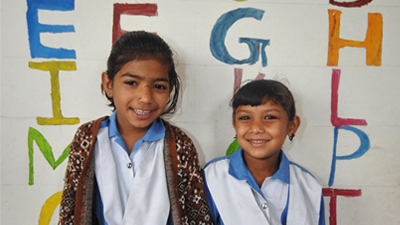Enabling Girls' Education
“In olden days only my brother could go to school, but now I am going too because it is totally free. We learn new things every day and school is so much fun,” said 8-year-old Sumaira, who studies in grade 2.
Traditionally, Sumaira and other girls like her would stay at home helping their mothers with daily chores or looking after their younger siblings. But with the provincial government’s Sindh Education Sector Reform Program (SERP), supported by the World Bank, Sumaira goes to school in Aliabad village of District Jamshoro, Sindh. Sumaira can dream now, and she dreams of becoming a teacher.
SERP is helping children like Sumaira and her younger brother Wahid to fire their imaginations about the limitless options life has to offer. These young children are the future of Pakistan and their education today will ensure a prosperous tomorrow for all.
With the help of SERP, the primary net enrollment rate has increased from 50 percent to 54 percent in Sindh, which translates into an additional 600,000 children in school. In addition, the ratio of female-male primary net enrollment in rural areas has increased from 61 percent to 76 percent.
Free textbooks are a boon for learning
Asma Gul is getting free textbooks through Sindh Education Reform Program. Unlike her elder brothers, who do not go to school, Asma feels happy to be going to school and fortunate that she need not worry about the books as free textbooks for every student are ensured by the SERP. She feels that free textbooks would further help the students’ learning.
Abdul Majeed teaches at the Government Boys Higher Secondary School in Unarpur. According to him provision of text books free of cost, stipend to students and recruitment of teachers on merit by the provincial government has resulted in rise in the number of children being admitted to schools. “Young girls who were once restricted to their homes have started going to school”. He believes there is hardly a chance of misuse of scholarship money as the stipend is directly sent to the recipients’? He also appreciated the fact that since the amount of stipend is directly related to the student’s enrolment, this is encouraging more students to enroll themselves in the school.
Teacher recruitment and placement
Approximately 13,500 new teachers were hired into government service over two recruitment rounds from 2009 onwards, based on test scores and other objective criteria and locally placed in schools under fixed-term, school-specific contracts. Evidence suggests that local teachers recruited on merit have a lower rate of absenteeism on average than teachers hired from far off places through nontransparent recruitment procedures.
Ghulam Sakeena, a teacher in the Government Primary School in Wapda Colony, Jamshoro, is one of the teachers who have been appointed under the reform package for a specific school. She says that she is satisfied with her job as she gets to live with her family. She said, “I won’t be able to continue this job if I am sent to anyplace away from my family.”

